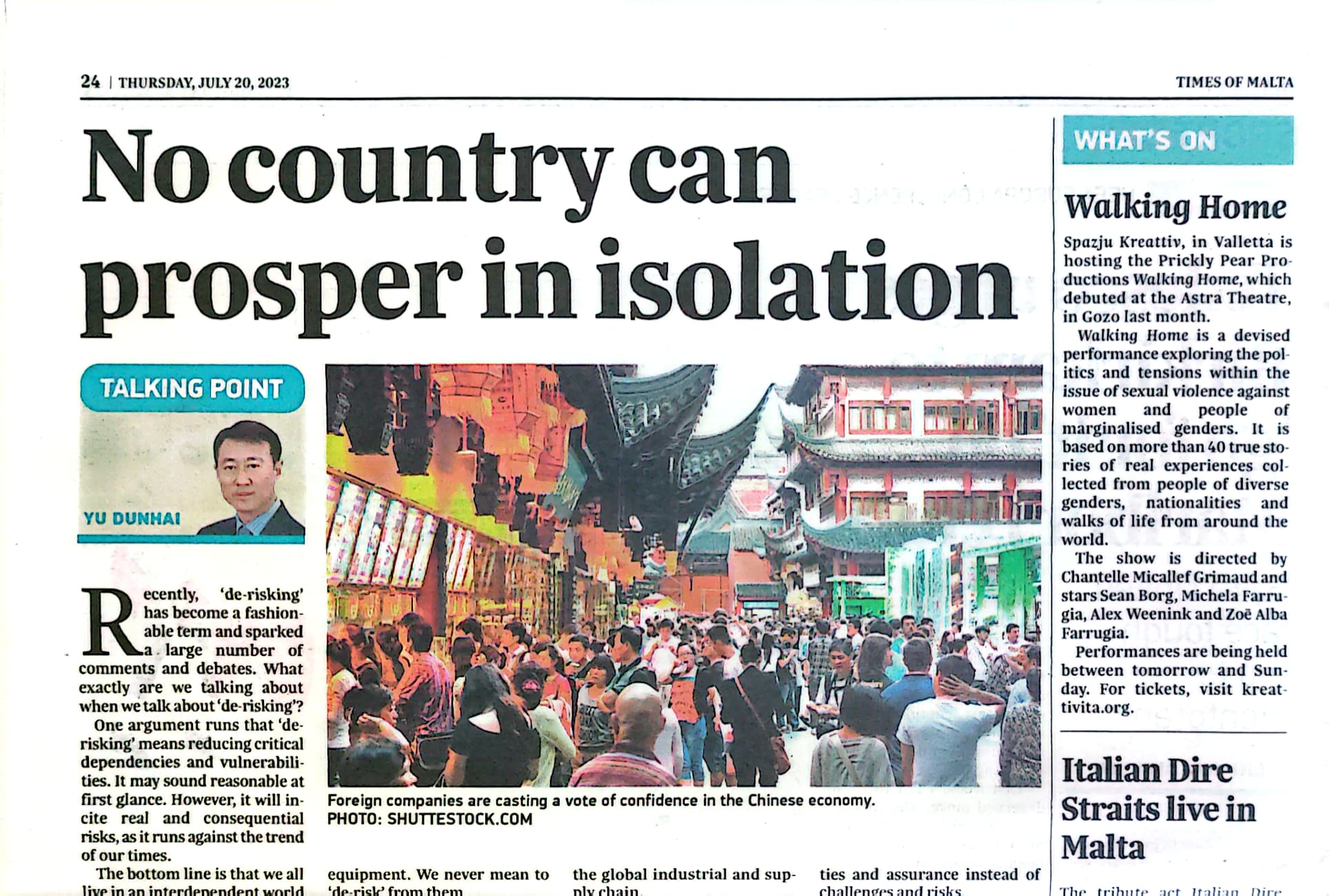
On 20th July 2023, H.E. Ambassador Yu Dunhai published a signed article titled "No country can prosper in isolation" on "Times of Malta". The full text is as follows:
Recently, "de-risking" has become a fashionable term and sparked a large number of comments and debates. What exactly are we talking about when we talk about "de-risking"?
One argument runs that "de-risking" means reducing critical dependencies and vulnerabilities. It may sound reasonable at first glance. However, it will incite real and consequential risks, as it runs against the trend of our times.
The bottom line is that we all live in an interdependent world and our economies are inextricably linked. We are all to some extent dependent on others in one way or another. In the age of globalization, no country can prosper in isolation. It is a far cry to exaggerate the normal economic relations as excessive dependence, or even simply equate interdependence with insecurity.
In fact, the formation and development of global industrial and supply chains are determined by market forces and are of history choices. Political interference and unilateral protectionism will only bring about chaos and harm the interests of all countries. Pursuing absolute security is like locking oneself in a dark room. While wind and rain may be kept outside, it will also block light and air.
While China possesses all the sections in the UN International Standard Industrial Classification of All Economic Activities, it still relies heavily on the global market. China's import volume climbed to 2.72 trillion US dollars in 2022. Those imported products can better meet diversified and multi-level consumer demands and reduce the price of consumer goods, which results in a win-win game.
China’s auto market has been dominated by German, Japanese and US cars for decades, but we don't regard it as a risk. Nor do we think it's a risk to get a CT scan using imported foreign medical equipment. We never mean to "de-risk" them.
As an island economy, Malta has a much better and deeper understanding of interdependence than many other countries in the world. It is therefore no coincidence that both China and Malta are strong advocates of true multilateralism and economic globalization.
Others say that "de-risking" requires reducing dependence on countries other than allies or with shared values. This is an even worse argument because it draws ideological lines among countries and divides the world into different camps, which in the long run will only lead to confrontation and conflict. History has taught us enough painful lessons in this regard. Over the past century and more, mankind has gone through bloody hot wars and a chilling Cold War. It is now the ardent aspiration of all countries to pursue peace and development through cooperation and collaboration.
In essence, "de-risking" is de facto “decoupling”. It won’t ensure security. Seeking an asymmetric and unbalanced trade structure is an impossible paradox of serious violation of market principles. The attempt of pursuing one’s own exclusive interests and ignoring the wider interests of others would set off trade conflicts and wars, which will undermine the international trade order and disrupt the security and stability of the global industrial and supply chain. Eventually, the world would gradually slide into the abyss of bloc politics and camp confrontation, hindering global development and human progress.
China has firmly embraced globalization and integrated it into the world economy. In the first half of this year, China's GDP grew by 5.5 per cent year-on-year to 59.3 trillion yuan (or 8.68 trillion USD), posting a steady economic rebound. China's foreign trade hit a record high of 20.1 trillion yuan (or 2.8 trillion USD). As the second largest economy in the world, China has become a major trading partner of more than 140 countries and regions, contributing more than 30% to world economic growth over the past 10 years, and is the main stabilizer and power source of world economic growth. China brings to the world opportunities and assurance instead of challenges and risks.
The enterprises have the best say in the attractiveness of the Chinese market, which was reflected by the increased presence and expanded businesses of foreign companies in China.
In the first five months of this year, the number of newly established foreign-invested enterprises soared to 18532, an increase of 38.3% over the same period last year. Foreign companies are casting a vote of confidence in the Chinese economy as they continue to see opportunities amid the country's opening-up efforts.
It is only natural that China and the EU do not always see eye to eye with each other. But China and the EU share extensive common interests. Cooperation and common ground far outweigh competition and differences. It's encouraging to witness that China-Europe exchanges in various areas have resumed swiftly and comprehensively in 2023.
In a complex and volatile world, as two major global forces, markets and civilizations, China and the EU need to increase dialogue and cooperation, and stand against attempts to decouple economies or sever supply chains, thus injecting fresh impetus into China-EU relations and global peace, stability and prosperity.
